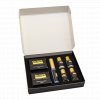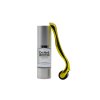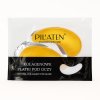Cosmetics
Skin care is very important. Your skin and complexion will look younger, healthier and you will gain even more confidence. However, it is very important to use the right products and tools when taking care of your skin to ensure the perfect result. You can also take part in an ultrasonic spatula or chemical peel course. You can then use the skills you learn in your beauty salon. In addition to this, we offer a range of quality beauty products to ensure you have healthy looking skin.
Product sorting
List of products
Skincare is a key part of your daily ritual, ensuring a youthful, healthy appearance and boosting your self-confidence. To achieve the perfect result, it is essential to select and use quality products and tools that are suitable for your skin type.
For those who want to take their skincare skills to a professional level, there are special courses available, such as ultrasonic spatulas or chemical peels. You can then apply these skills in your own beauty salons to help clients achieve more beautiful and healthier skin.
In addition, we offer a wide range of high-quality beauty products to help you achieve healthy-looking skin. Our products are carefully selected and tested to meet the highest standards and are as gentle on your skin as possible.
An investment in skincare is an investment in your health, beauty and well-being. With our products and beauty courses, you'll gain the expertise you need for perfect skin that will follow you throughout your life.
The most frequent questions and answers for Cosmetics.
1. What does the accredited beautician course include?
Answer: The accredited beautician course includes theoretical and practical training focused on the basics of cosmetic care, dermatology, hygiene, skin care, face and décolletage massage, application of facial masks, makeup and the use of cosmetic devices. After successfully completing the course, you will receive a certificate recognized in your field.
2. What are the advantages of completing an accredited beautician course?
Answer: The benefits of completing an accredited cosmetology course include gaining professional knowledge and skills, obtaining a certificate recognized in the field, the possibility of opening your own cosmetology practice or employment in beauty salons and constant access to current trends and techniques in cosmetology.
3. What additional courses are available for beauticians?
Answer: Additional courses for beauticians include training in chemical peels, eyebrow lamination, eyelash extensions, microdermabrasion, mesotherapy, permanent makeup and other specialized cosmetic techniques. These courses will allow you to expand your range of services and increase your qualifications.
4. What is a chemical peel and what are its benefits?
Answer: A chemical peel is a cosmetic procedure in which a chemical solution is applied to the skin to remove dead skin cells and promote the regeneration of new, healthier skin. The benefits of a chemical peel include improving skin texture, reducing wrinkles, age spots and acne, and overall skin rejuvenation.
5. How is eyebrow lamination performed and what are its advantages?
Answer: Eyebrow lamination is a procedure that ensures long-term strengthening, shaping and lifting of the eyebrows using special products. The benefits of brow lamination include natural-looking shaped brows, long-lasting results (up to 6 weeks) and minimal need for at-home brow grooming.
6. What is the difference between creams, serums and face masks?
Answer: Creams are moisturizing products that provide basic skin care, provide hydration and protection from external influences. Serums are concentrated products with a high content of active substances that solve specific skin problems such as wrinkles, pigmentation or loss of elasticity. Facial masks are intensive treatments that are used once or twice a week to achieve deeper hydration, nourishment or cleansing of the skin.
7. How to use skin serums correctly?
A: A face serum should be applied to clean, dry skin, usually before applying a moisturizer. Apply a few drops of the serum to the face and gently massage into the skin until completely absorbed. Use the serum in the morning and/or evening as recommended on the package.
8. How often should face masks be used?
Answer: Face masks should be used once or twice a week, depending on the type of mask and your skin's needs. Follow the instructions on the package and adjust the frequency of use according to your skin type and the specific problems you want to address.
9. What are the most common ingredients in creams and serums?
Answer: The most common ingredients in creams and serums include hyaluronic acid, retinol, vitamin C, peptides, antioxidants, ceramides, niacinamide, and various plant extracts. These ingredients help hydrate, nourish and protect the skin, improve its texture and reduce the signs of aging.
10. Where can I take an accredited beautician course and additional courses?
Answer: You can take accredited beautician courses and additional courses at specialized schools, academies and educational centers focused on cosmetics and aesthetics. Information on available courses and dates can be found on the websites of these institutions or you can inquire directly with the education provider.






















